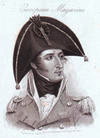
Lord Cochrane
The Napoleonic wars were a long and trying experience for the British. Therefore, when on February 21, 1814 a man wearing the uniform of a British military officer showed up at an inn on the coast of the English Channel announcing that the war was over, that a party of Cossacks had killed Napoleon, and that the Bourbon government was restored, everyone who heard the news was ecstatic.
Swift horses were dispatched to speed the news to London. In the capital people rejoiced, and jubilant investors bid up the stocks on the London exchange. Then the bad news arrived. Napoleon was still alive. The report of his death had just been a hoax.
In the investigation that followed, a scheme to manipulate prices on the London stock exchange was uncovered. Some circumstantial evidence indicated that a popular military and political hero called Lord Thomas Cochrane had masterminded the plan. He was arrested, tried, and imprisoned.
But as time passed many began to question whether Cochrane was really guilty, or whether he had been framed by his political enemies. After all, there was no evidence that Cochrane had profited from the stock market's rise. Cochrane escaped from prison and was thrown back inside again before finally being released due to the popular support that he enjoyed. In 1831 the King pardoned him of any involvement in the stock market hoax. Historians now agree that Cochrane was probably not behind the scheme to defraud investors, but the real perpetrator of the hoax remains unknown.
Links and References
- Nick Yapp. Great Hoaxes of the World (and the hoaxers behind them). Robson Books. 1995. 42-43.
- The Historical Maritime Society. Nelson and His Navy - Cochrane. (A brief online bio of Cochrane.)
- Robert Harvey. Cochrane: The Life and Exploits of a Fighting Captain. Carroll & Graf. 2001. (A recent bio of Cochrane, who was the inspiration for the novels of Patrick O'Brian.)
- Brian Vale, Audacious Admiral Cochrane: The True Life of a Naval Legend . Conway Maritime Press. 2005.


Comments